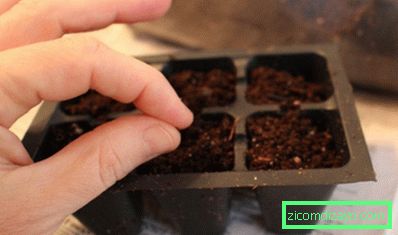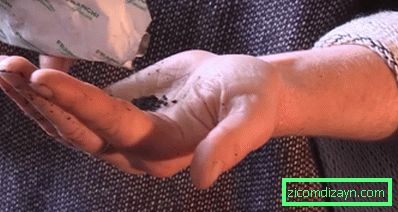How to grow basil on a windowsill
Basil is ideal for growing a house, as it is not whimsical, grows in winter, and in summer, it looks nice and smells very tasty. If you are new to home gardening, we recommend starting with the planting of this herb! In this material you will find all about how to grow a basil on a window sill, how to care for it and properly pin it to get as much harvest as possible.
How to plant basil with seeds
You can grow basil in a pot from cuttings or from a young shoot from the bed, but better and longer (almost a year!) At home, the harvest yields a basil grown from seeds.
To plant a basil on a windowsill you will need:
- Seeds;
- A variety of basil will suit anyone, but keep in mind that the violet and Greek small-leaved varieties grow longer and more difficult. Especially fast and easy grow small-leaved and low-growing varieties of basil.
- Soil (for more details on choosing the soil and its preparation, see Step 2);
- Expanded clay or pebbles for drainage;
- Pot of 1-2 liters or a large container with a depth of at least 15 cm, in which the shoots of the basil can grow at a distance of 10 cm from each other. The container for growing basil must have drainage holes;
- Food film or plastic bag;
- Shoulder.
Step 1. Seed preparation
This stage is not necessary, but it is desirable if you want to speed up the appearance of the first shoots a little. Soak the seeds in warm water for 1-2 days, changing the water every 12 hours (or more often), then hold them in a slightly pink solution of potassium permanganate for 2 hours and finally, dry the seeds on a napkin or gauze. Catch the seeds with a toothpick.
Step 2. Preparation of soil
Loose soil is an important condition for success. Suitable soil can be created from:
- Mixtures of universal soil for indoor plants with garden soil (in a ratio of 1: 1);
- Mixtures of vermicompost and soil for indoor plants (in a ratio of 1: 4);
- Mixtures of vermicompost with cocogrunt (in proportion 1: 2).
Do not forget to treat the purchased soil before planting seeds: pour it on a baking sheet and bake in the oven at a temperature of 100-120 degrees for about an hour, and then feed it with some mineral fertilizer. This procedure will prevent the appearance of pests in the future.
Next, put the claydite or gravel on the bottom of the container to get a drainage layer 2-3 cm thick. Finally, we pour the prepared soil from the top, not reaching 3-4 cm to the edges, leveling the surface, and then abundantly water the soil.

Watering the soil
Step 3. Sowing the seeds
Now you need to sow the seeds at a distance of about 2 cm from each other, sprinkle them with a layer of earth in 1-2 cm, and then cover the pot with food film or a packet to create a greenhouse effect.
Then we transfer the pot to a warm place and wait for the first shoots to appear, periodically opening the film to air the planting. Watering seedlings in this period is not necessary, if desired, they can be slightly sprayed, then the greens will turn out juicier.
- Depending on the variety and favorable conditions, the first sprouts of basil will appear in 7-12 days.
When the shoots finally appear, remove the film and boldly shred the shoots so that between the remaining stems there is a gap of 10 cm. Then transfer the pot to the solar window sill.
- When seedlings grow to 5-7 cm, 2-3 cm of soil can be added to the pot to strengthen young shoots.
Since the film is removed, the plant needs to be taken care of - regularly watering, loosening the ground, controlling temperature and lighting. Below is a memo with the main rules of care.
Care of the basilica
Watering: In summer, water and, if desired, sprinkle basil in the morning every day, the soil should always be moist but not overflowed. In winter, watering should be moderate - 2 times a week will be enough.
Temperature: Watch out for the air temperature, it should be quite high - 20-25 degrees. Keep in mind that basil does not tolerate drafts, and at an air temperature below 20 degrees begins to lose flavor.
Light: In the warm season (from March to August), the basil needs 6 hours of natural sunlight. In winter, without additional illumination can not do. About how and how to create it, read further in Step # 4.
Soil fertilization: If the soil is not fertile enough, it can be fertilized once a month: with biohumus, Agrolife (1 tsp on the surface of the earth) or other organic fertilizers.
Step 4. Creating favorable lighting
If you grow basil in autumn or winter (September to February), then your mini-garden must be artificially illuminated for 12 hours a day.
- For this, phyto-lamps or LED lamps with a warm white light of 2700 K, installed at a distance of 15-20 cm from plants, are suitable.
Step 5. Proper Harvesting
The key to getting a fluffy and branched with a lot of basil leaves is frequent and early circumcision, which is also called pinching.
After 1-1,5 months, when the basil will grow 4-6 real leaves, you need to harvest the first crop, nipping off the tops of 2 leaves.
Further, when the basil gets 3 sets of real leaves, its top should be immediately pricked, cutting off the stem just above the small leaves, which only begin to grow from the sinuses. The place of the cut and those very small, barely noticeable leaves can be seen in the photo below. This procedure should be carried out every few weeks.

Pinching Basil
- When you need only a few leaves here and there to add to a dish or drink, pick the older side leaves and pinch them where they meet the main stem (shown in the photo).

Lateral shoots of basil
- Remember that plants should always have at least 4 leaves at the bottom. If you cut off the lower shoots, the basil will begin to grow in height, rather than breadth and will become less productive.
- If you notice a flowering bud, immediately cut it and two leaves under it. If this is not done, the greens will begin to deteriorate.
We offer you to see a visual video lesson about growing a basil on a windowsill.
3 alternative ways of growing basil in pots
- All the same method, but with germination of seeds in temporary containers and with subsequent picking in a constant
In our instructions, we talked about sowing seeds at once in a permanent pot, which is convenient because the plant does not need to be transplanted after the first shoots. But if the first 1.5 months you do not want to clutter the windowsill with a large pot, then you can first sow the seeds in a small container (eg, in glasses of sour cream) and only after achieving shoot growth of 5-7 cm, transplant them in a large pot.

Clearly, the process of picking basilics you can see in the next video tutorial.
- Transplant basil from open ground into a pot
If you grow basil on a bed, then you can simply transplant the young plant into a pot. Such a basil will bring a harvest faster, but it will not last long, as it will soon blossom.
- Cultivation of basil from a handle
Another way to accelerate and simplify the cultivation of basil is by planting cuttings. To do this, cut off the tops or side shoots from an adult plant (you can even buy basil), grow them in water for 1-2 weeks (changing it every day), and then plant in a pot. The first harvest of such seedlings will give after 2-3 weeks, but it only lasts 3-4 months.

 Cultivation of Basil Basil
Cultivation of Basil Basil

